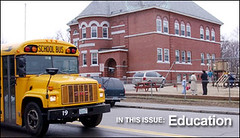Even more on schools
 Graphic from Center for American Progress.
Graphic from Center for American Progress.Last Thurday's District Extra was a special edition on "back to school," but it really focused more on the administrative side of things rather than linking students and parents to education, like the special section of the Louisville Courier-Journal, "Survive & Thrive: A guide to school success for parents and students."
Sunday's Post featured a column by David Broder, "A Fight Over Marginalia" made the point that the No Child Left Behind Act often misses "the larger issues in education. A better perspective on those questions was provided last week in a report from two Washington-based liberal think tanks titled "Getting Smarter, Becoming Fairer: A Progressive Education Agenda for a Stronger Nation."
A task force created by the Center for American Progress and the Institute for America's Future scoured the country looking for programs that work and that could be expanded to national scale -- if the political will and resources were present.
The recommendations put the current dispute over NCLB into proper perspective as a fight over marginalia. The report, in broad outline, calls for:
· Lengthening the school year beyond the standard 180 days and reducing summer vacation time, when many students forget what they have just learned. [This blog advocates this for many reasons]
· Extending the school day by incorporating meaningful after-school programs. [DC does this somewhat]
· Providing preschool programs for 3- and 4-year-olds and all-day kindergartens. [DC does this]
· Strengthening the high-school curriculum to ensure that graduates are ready for college or advanced technical training, and bridging the gap between 12th grade and further education.
· Drafting voluntary national standards for all levels of classes, a needed improvement on current widely varying state-by-state standards.
· Improving student assessments beyond the current tests and ensuring assistance to schools and students who are lagging.
· Upgrading teacher training and providing pay incentives for classroom performance and rewards for top teachers assigned to struggling schools.
· Building more community schools, where social services for parents are located in the same building as classrooms and families are mobilized to help students succeed. [This is a big plank of the public assets viewpoint of this weblog]
None of these ideas is new; all have been tested in communities with positive results. But now they are only scattered examples."



0 Comments:
Post a Comment
<< Home